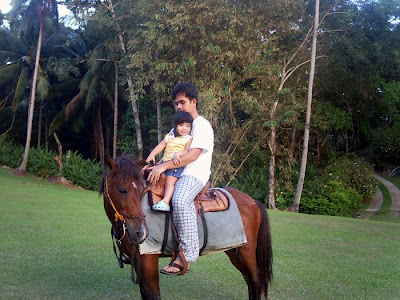TO MY FELLOW BOHOLANOS : nga kanunay sungugon na idja-idja aho-aho , i am reposting this article as an inspiration and best explanation of idja-idja aho-aho. Let's be proud because we belong to a noble culture! Just click the title to bring you to the original source. Thank you!
CHILD OF THE SUN: Idja-idja, aho-aho!
by Ting Tiongco/MindaNews
Tuesday, 28 July 2009 22:29
(Speech of acceptance as one of the Ten Outstanding Boholano Award (Tobaw) delivered at the Tapok Bol-anon Tibuok Kalibutan awarding ceremonies on 25 July).
TAGBILARAN, Bohol (MindaNews/28 July) -- I accept this award both with great pride and humility. I dedicate this award to my late parents who came from Bohol; my father from Bilar, and my mother, a Manigque from Tagbilaran. My mother, who died a few months ago, lived 63 out of her 86 years in Mindanao. But she died a true Boholana, speaking Binol-anon to the end. I was not born in Bohol. Neither did I grow up here. My parents made it clear to their children who were growing up in Mindanao that we are Bol-anons. Ang Bolanon, murag Amerkano. Maskin asa ka ma tawo, basta Amerkano ang imong tatay o nanay, Amerkano ka lang guihapon. Ang Bol-anon, mao sad. Maskin asa ka matawo, basta Bol-anon ang imong kaguikan, Bol-anon ka lang guihapon. Mailhan man gud ang Bol-anon sa uban, kay tag-as man ug ilong.
I was often puzzled, growing up as Bol-anon in Davao where a welter of cultures flourish; the moment my companions knew I was Bol-anon, I was immediately set apart as different from the rest. I was puzzled by the saying ‘ idja-idja, aho-aho!’ often said in jest by classmates. And this was usually followed by the declaration that Bohol was ‘outside da Pilipins’. Predictably there ensued a typical schoolboy fistfight. Sinumbagay!
I often asked my mother what all this was about but she only told me to be proud of such things. There was a history and a culture behind this that she did not bother to explain because perhaps she knew that sometime in my life I would realize what it meant.
And indeed, I did. It happened the first time I came to Bohol to set up a health cooperative. I was warned that the Bol-anon attitude of ‘idja-idja aho-aho’ was against the basic principles of cooperativism. But setting up a hospital and health services cooperative in the land of my parents, ang akong yutang guinikanan, was a promise I made my father before he died.
So 15 years ago I landed in Tagbilaran, walked to a restaurant, and unthinkingly ordered more lunch than I could consume. I had the rest packed in a brown paper bag to give to a hungry street child.
Outside, I met a raggedy malnourished little boy and wordlessly handed him the brown paper bag. He looked suspiciously at me and asked what was in it. Learning it was food, he immediately ran away, shrieking ‘Di ko!’ (No!)
I was surprised, a bit disheartened. So I walked to the cathedral where I expected to find beggars. There I found an old woman sitting on the ground by the main door, in the heat of noon, clutching a rosary. This time I was more circumspect. I explained to her that I had ordered too much for lunch and I was loathe to see so much food wasted and I was wondering if she would accept the rest, assuring her that it was clean. She gladly took the brown paper bag, thanking me profusely. Then, as I was leaving, happy that no food was wasted, she called after me.
‘ Doy,’ ingon siya, ‘ pila man ni?’ (‘Doy,’ she asked, ‘how much is this?’)
I was floored. Only then did I realize what ‘idja-idja, aho-aho’ means.
It means the Bol-anon does not beg!It means that I belong to a noble culture that believes Man must provide for himself and the community he belongs to. It means that we are free of the humiliating cultural muck of Mendicancy that the rest of our country is drowning in.
It means that we believe in ourselves. In our own capacity to provide for our own needs through our own resources.
Happily, this is what cooperativism is all about. Self-sufficiency and pride in one’s own.
Then this could be very well our battle cry: ‘idja-idja, aho-aho!’. With this, from ‘outside da Pilipins’ we may be able to rebuild the Philippines, flattened by financial crises, sucked dry by unscrupulous politicians, debased in its own eyes by cultural pollution and disoriented by a demented media that foists the ‘Wowowee’ mentality on Filipinos in massive daily noontime doses.
Idja-idja, aho-aho!
Mabuhi ang Bol-anon!
Mabuhi and Filipinas!
[Dr. Jose “Ting” M. Tiongco, chief executive officer of the Medical Mission Group Hospitals and Health Services Cooperative-Philippines Federation, writes a column, Child of the Sun, for MindaNews. He is author of two books, “Child of the Sun Returning” (1996) and “Surgeons Do Not Cry” (2008). The second book is available at UP bookstore, National bookstore and MindaNews]
love & kisses
































































